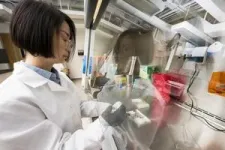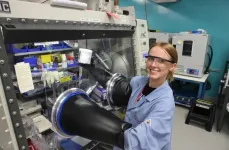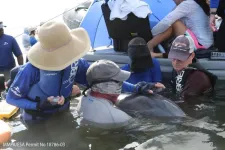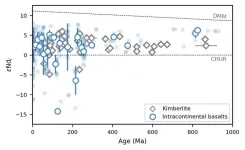New Director of the Bates Center for the Study of the History of Nursing
2024-10-16
(Press-News.org) PHILADELPHIA (October 16, 2024) – J. Margo Brooks Carthon, PhD, RN, FAAN, the Tyson Family Endowed Term Chair for Gerontological Research; Professor of Nursing in the Department of Family and Community Health; and Associate Director of the Center for Health Outcomes and Policy Research, has been appointed the new Director of the Barbara Bates Center for the Study of the History of Nursing (Bates Center), the preeminent history of nursing research center and archive. The Bates Center amplifies the importance of the history of nursing and healthcare to the development of crafting effective health policies and strategies to improve health for all.
“The evolution of the Bates Center continues to be a source of pride for us at Penn Nursing. Dr. Brooks Carthon brings expertise in an array of research methods including historical approaches, health services, and implementation science aimed at advancing health equity. Her leadership will build on the legacy of faculty who were foundational in creating this important resource for historians of nursing and beyond,” says Penn Nursing Dean Antonia M. Villarruel. “Working collaboratively with Penn Libraries and Bates Curator, Dr. Jessica Martucci, I am confident that nursing history will live beyond the archives and continue to inform policy and practice. Dr. Brooks Carthon scholarly work exemplifies what is possible.”
“As the Bates Center Director, I look forward to honoring the nursing profession’s historic contributions to addressing health inequities by integrating equity as a core value, one which will help to prioritize our collections, initiatives and collaborations,” said Brooks Carthon. “I recognize that advancing population health and achieving health equity requires a multipronged approach which brings together historians with clinicians, health services researchers, community participatory practitioners, innovators, and change agents from all backgrounds. I look forward to the Bates Center being a home where scholars from diverse perspectives can engage creatively to support bold and transformational ideas to improve population health locally, nationally and internationally.
The Bates Center is committed to providing the broadest and highest quality scholarship and educational programs and is equally committed to disseminating research findings through publications and interdisciplinary sharing and collaborations. By these means, the Bates Center dedicates itself to a leadership role in advancing the public’s knowledge of the history of nursing and healthcare.
Its goals are to:
Advance knowledge in the history of nursing and healthcare.
Engage with scholars whose research aligns with the mission of the Center, the School, the University, and the pressing needs of healthcare systems in our nation and around the globe.
Maximize the visibility, accessibility, and scope of the Center’s historical collections.
Through its extensive collections, fellowships, and curricula opportunities, the Bates Center provides considerable evidence for scholars and students to question traditional disciplinary paradigms; to give voice to the historical power of nursing; and to analyze the strengths and weaknesses of local and global approaches to issues of health and illness. It is a committed partner in preserving all voices of nursing history, opening access to collection materials, and growing our digitized collections and sites.
# # #
About the University of Pennsylvania School of Nursing
The University of Pennsylvania School of Nursing is one of the world’s leading schools of nursing. For the ninth year in a row, it is ranked the #1 nursing school in the world by QS University. Our Bachelor of Science in Nursing (BSN) is among the top ranked programs in the nation according to the 2025 U.S. News & World Report’s Best Colleges rankings. Our School also consistently ranks highly in the U.S. News & World Report annual list of best graduate schools and is ranked as one of the top schools of nursing in funding from the National Institutes of Health. Penn Nursing prepares nurse scientists and nurse leaders to meet the health needs of a global society through innovation in research, education, and practice. Follow Penn Nursing on: Facebook, X, LinkedIn, YouTube, & Instagram.
END
ELSE PRESS RELEASES FROM THIS DATE:
2024-10-16
Scientists are developing advanced tools to understand and treat neurological symptoms such as brain fog associated with respiratory diseases like influenza. The Biomedical Advanced Research and Development Authority (BARDA), part of the Administration for Strategic Preparedness and Response (ASPR) within the US Department of Health and Human Services (HHS), awarded a three-year contract to researchers at the University of Rochester to develop a technology to model respiratory disease effects on the brain ...
2024-10-16
WASHINGTON, DC – As the nation continues to build a diverse, clean-energy workforce, the Department of Energy (DOE) today announced that applications are being accepted for the Summer 2025 term of two undergraduate internship programs.
The Office of Science Undergraduate Laboratory Internships (SULI) program and the Community College Internships (CCI) program are unique opportunities open to all current and recent college undergraduates. Interns will learn about science and technology careers, team science, networking, and gain the experience needed to transition from internship to employment.
The application deadline for both programs is January 8, 2025, ...
2024-10-16
UNIVERSITY PARK, Pa. — Several medications are available to treat high blood pressure, but more than 10 million Americans do not respond to the treatments, according to the American Heart Association. Using a bioelectronic device to deliver pulsed electricity to the body has proven to be a promising strategy to treat drug-resistant hypertension patients, according to Penn State researcher Tao Zhou, although he noted that its practical application in patient care has significant limitations.
Zhou, assistant professor of engineering science and mechanics and of biomedical engineering, received ...
2024-10-16
U.S. researchers have detected microplastic particles in air exhaled by wild bottlenose dolphins, suggesting that inhalation may be a relevant route of exposure to these potentially harmful contaminants. Miranda Dziobak of the College of Charleston in South Carolina, U.S., and colleagues present these findings in the open-access journal PLOS ONE on October 16, 2024.
Around the world, humans and numerous other animals are exposed to tiny particles of plastic contaminants known as microplastics. In humans and rodents, microplastic exposure has been linked to adverse health impacts, such as oxidative stress and inflammation. Ingestion ...
2024-10-16
A new paper published today in Science Advances exposes the global aquaculture sector’s growing dependence on wild fish. Despite industry claims to the contrary, these findings highlight how the growing appetite for expensive farmed salmon can leave coastal communities struggling to access affordable local fish like sardines and anchovies. Instead, these small pelagic fish are frequently caught, processed, and “reduced” to fishmeal and fish oil, almost all of which is used to feed farmed fish. These ‘reduction fisheries’ account for 26% of global ocean catch.
“As the aquaculture industry grows, so does its ...
2024-10-16
Neural spheroids — 3D clusters of brain cells — are emerging as essential tools for understanding neural networks and studying neurological diseases in the lab. EPFL’s e-Flower, a flower-shaped 3D microelectrode array (MEA), allows researchers to monitor the electrical activity of these spheroids in a way that was previously impossible. This breakthrough, published in Science Advances, lays the groundwork for more sophisticated research on brain organoids, which are complex, miniaturized models of brain tissues.
“The ...
2024-10-16
A study published in the journal Science Advances suggests that global fish farming, or aquaculture, may rely on significantly larger quantities of wild-caught ocean fish than previously calculated. The study is part of a special issue focused on expanding contributions from the aquaculture industry to food systems with an aim towards sustainability.
These findings call into question long-held assumptions about the sustainability of the rapidly growing aquaculture industry and provides a range of plausible estimates for its impact on wild fish populations.
The research, led by an international team of scientists ...
2024-10-16
A collaborative effort between investigators at the National Institutes of Health’s National Institute of Allergy and Infectious Diseases (NIAID) and Massachusetts General Hospital (MGH), a founding member of the Mass General Brigham healthcare system, demonstrates the potential of precise genome editing technologies, called adenine base editors, to correct disease-causing mutations in stem cells from patients with X-linked chronic granulomatous disease (X-CGD), a rare genetic disorder characterized by high susceptibility to infections. The findings are published in Science Translational Medicine.
Patients with ...
2024-10-16
On present-day Earth, plate subduction continuously modifies the chemical composition of the convecting mantle, and various mantle sources linked to these processes have been widely studied.
However, when did global chemical heterogeneity of the convecting mantle first emerge in Earth's geological history? And how might Earth’s geodynamic evolution have influenced the chemical composition of the convecting mantle over time?
Researchers from the Institute of Oceanology of the Chinese Academy of Sciences (IOCAS), along with collaborators from Australia, Switzerland and the USA, have tried to address these questions ...
2024-10-16
Multilingual students face unique challenges that can hurt their performance in school. New methods of teaching may help close this gap, according to a new study from the University of Georgia.
In the United States, English is the main language used in classrooms. Schools also tend to rely on spoken communication to teach and written exams to assess learning.
That can make it difficult for multilingual students to express themselves. This is especially true in science classes, with their specific terms and complex sentence structures.
So a UGA researcher developed an immersive virtual reality game to communicate scientific ...
LAST 30 PRESS RELEASES:
[Press-News.org] New Director of the Bates Center for the Study of the History of Nursing








